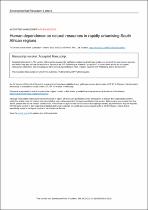 ResearchSpace
ResearchSpace
Human dependence on natural resources in rapidly urbanising South African regions
JavaScript is disabled for your browser. Some features of this site may not work without it.
- ResearchSpace
- →
- Research Publications/Outputs
- →
- Journal Articles
- →
- View Item
| dc.contributor.author |
Balbi, S

|
|
| dc.contributor.author |
Selomane, O

|
|
| dc.contributor.author |
Sitas, Nadia E

|
|
| dc.contributor.author |
Blanchard, Ryan

|
|
| dc.contributor.author |
Kotzee, Ilse M

|
|
| dc.contributor.author |
O’Farrell, Patrick J

|
|
| dc.contributor.author |
Villa, F

|
|
| dc.date.accessioned | 2019-04-02T07:31:15Z | |
| dc.date.available | 2019-04-02T07:31:15Z | |
| dc.date.issued | 2019-01 | |
| dc.identifier.citation | Balbi, S. et al. 2019. Human dependence on natural resources in rapidly urbanising South African regions. Environmental Research Letters, vol. 14(4): DOI: https://doi.org/10.1088/1748-9326/aafe43 | en_US |
| dc.identifier.issn | 1748-9326 | |
| dc.identifier.uri | https://iopscience.iop.org/article/10.1088/1748-9326/aafe43 | |
| dc.identifier.uri | DOI: https://doi.org/10.1088/1748-9326/aafe43 | |
| dc.identifier.uri | http://hdl.handle.net/10204/10902 | |
| dc.description | © 2019 The Author(s) | en_US |
| dc.description.abstract | Enhancing the governance of social-ecological systems for more equitable and sustainable development is hindered by inadequate knowledge about how different social groups and communities rely on natural resources. We used openly accessible national survey data to develop a metric of overall dependence on natural resources. These data contain information about households' sources of water, energy, building materials and food. We used these data in combination with Bayesian learning to model observed patterns of dependence using demographic variables that included: gender of household head, household size, income, house ownership, formality status of settlement, population density, and in-migration rate to the area. We show that a small number of factors – in particular population density and informality of settlements – can explain a significant amount of the observed variation with regards to the use of natural resources. Subsequently, we test the validity of these predictions using alternative, open access data in eThekwini and Cape Town metropolitan areas of South Africa. We discuss the advantages of using a selection of predictors which could be supplied through remotely sensed and open access data, in terms of opportunities and challenges to produce meaningful results in data-poor areas. With data availability being a common limiting factor in modelling and monitoring exercises, access to inexpensive, up-to-date and free to use data can significantly improve how we monitor progress towards sustainability targets. | en_US |
| dc.language.iso | en | en_US |
| dc.publisher | IOP Publishing | en_US |
| dc.relation.ispartofseries | Worklist;22217 | |
| dc.subject | Informality | en_US |
| dc.subject | Machine learning | en_US |
| dc.subject | Openly accessible data | en_US |
| dc.subject | Provisioning ecosystem services | en_US |
| dc.subject | Sustainable development | en_US |
| dc.subject | Urban transition | en_US |
| dc.title | Human dependence on natural resources in rapidly urbanising South African regions | en_US |
| dc.type | Article | en_US |
| dc.identifier.apacitation | Balbi, S., Selomane, O., Sitas, N. E., Blanchard, R., Kotzee, I. M., O’Farrell, Patrick J, & Villa, F. (2019). Human dependence on natural resources in rapidly urbanising South African regions. http://hdl.handle.net/10204/10902 | en_ZA |
| dc.identifier.chicagocitation | Balbi, S, O Selomane, Nadia E Sitas, Ryan Blanchard, Ilse M Kotzee, O’Farrell, Patrick J, and F Villa "Human dependence on natural resources in rapidly urbanising South African regions." (2019) http://hdl.handle.net/10204/10902 | en_ZA |
| dc.identifier.vancouvercitation | Balbi S, Selomane O, Sitas NE, Blanchard R, Kotzee IM, O’Farrell, Patrick J, et al. Human dependence on natural resources in rapidly urbanising South African regions. 2019; http://hdl.handle.net/10204/10902. | en_ZA |
| dc.identifier.ris | TY - Article AU - Balbi, S AU - Selomane, O AU - Sitas, Nadia E AU - Blanchard, Ryan AU - Kotzee, Ilse M AU - O’Farrell, Patrick J AU - Villa, F AB - Enhancing the governance of social-ecological systems for more equitable and sustainable development is hindered by inadequate knowledge about how different social groups and communities rely on natural resources. We used openly accessible national survey data to develop a metric of overall dependence on natural resources. These data contain information about households' sources of water, energy, building materials and food. We used these data in combination with Bayesian learning to model observed patterns of dependence using demographic variables that included: gender of household head, household size, income, house ownership, formality status of settlement, population density, and in-migration rate to the area. We show that a small number of factors – in particular population density and informality of settlements – can explain a significant amount of the observed variation with regards to the use of natural resources. Subsequently, we test the validity of these predictions using alternative, open access data in eThekwini and Cape Town metropolitan areas of South Africa. We discuss the advantages of using a selection of predictors which could be supplied through remotely sensed and open access data, in terms of opportunities and challenges to produce meaningful results in data-poor areas. With data availability being a common limiting factor in modelling and monitoring exercises, access to inexpensive, up-to-date and free to use data can significantly improve how we monitor progress towards sustainability targets. DA - 2019-01 DB - ResearchSpace DP - CSIR KW - Informality KW - Machine learning KW - Openly accessible data KW - Provisioning ecosystem services KW - Sustainable development KW - Urban transition LK - https://researchspace.csir.co.za PY - 2019 SM - 1748-9326 T1 - Human dependence on natural resources in rapidly urbanising South African regions TI - Human dependence on natural resources in rapidly urbanising South African regions UR - http://hdl.handle.net/10204/10902 ER - | en_ZA |





